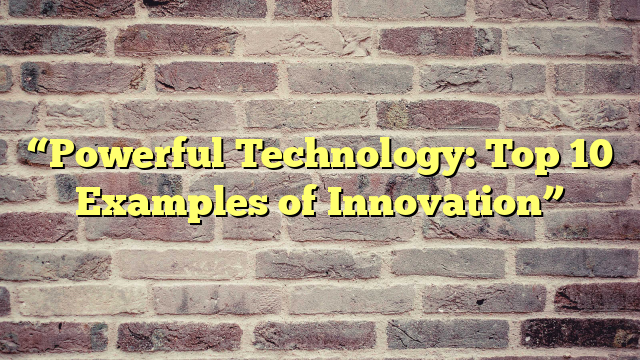Introduction
The world is constantly evolving with the advancement of technology. Every day, new innovations are introduced that revolutionize the way we live, work, and interact with each other. From smartphones to artificial intelligence, technology has become an integral part of our lives. In this article, we will discuss the top 10 examples of powerful technology that have transformed our world.
1. Artificial Intelligence (AI)
Artificial Intelligence, or AI, is the simulation of human intelligence processes by computer systems. It involves the development of algorithms that can perform tasks that usually require human intelligence, such as problem-solving, decision-making, and pattern recognition. AI is used in various industries, from healthcare to finance, and has made our lives easier in many ways. Some of the most significant examples of AI include virtual assistants like Siri and Alexa, self-driving cars, and chatbots used in customer service.
2. Internet of Things (IoT)
The Internet of Things, or IoT, refers to the interconnection of everyday devices via the internet. It allows these devices to communicate with each other and collect and exchange data. This technology has made our homes smarter, with devices such as smart thermostats, security systems, and kitchen appliances connected to the internet. IoT has also been beneficial in industries such as healthcare and transportation, where it enables remote patient monitoring and real-time tracking of goods.
3. Virtual and Augmented Reality (VR/AR)
Virtual and Augmented Reality, or VR/AR, are immersive technologies that create a computer-generated environment for users to interact with. VR technology allows users to experience a completely virtual world, while AR overlays digital content onto the real world. These technologies have been widely used in entertainment, with the development of VR games and AR filters on social media platforms. However, they also have practical applications, such as training simulations for medical and military personnel.
4. Blockchain
Blockchain is a decentralized digital ledger that records transactions in a secure and transparent manner. It enables data to be stored and shared without the need for a central authority, making it a secure and efficient way to transfer information. Blockchain has been primarily associated with cryptocurrencies like Bitcoin, but its potential goes beyond that. It has been used in supply chain management, voting systems, and even in the music industry to ensure fair distribution of royalties.
5. 5G Technology
5G technology is the latest generation of wireless networking technology. It offers significantly faster internet speeds, higher capacity, and lower latency compared to its predecessors. With 5G, we can expect to see advancements in industries such as autonomous vehicles, virtual and augmented reality, and the Internet of Things. It will also enable the development of smart cities, where everything from traffic lights to public transportation will be connected and controlled by 5G networks.
6. Nanotechnology
Nanotechnology involves the manipulation of matter at a molecular or atomic level. It has various applications in medicine, electronics, and energy production. In medicine, nanotechnology has been used to develop targeted drug delivery systems and diagnostic tools. In electronics, it has enabled the production of smaller and more efficient devices. Nanotechnology has also been explored as a way to generate clean and renewable energy.
7. 3D Printing
3D printing, also known as additive manufacturing, is the process of creating three-dimensional objects by adding layers of material on top of each other. It has been used in industries such as aerospace, automotive, and healthcare to create prototypes, customized products, and even human organs. 3D printing has made manufacturing more efficient and cost-effective, and its potential for growth is immense.
8. Quantum Computing
Quantum computing is a technology that uses the principles of quantum mechanics to perform calculations. It has the potential to solve complex problems that traditional computers cannot, making it a game-changer in various industries. Quantum computers could be used in drug discovery, financial modeling, and weather forecasting, among others. While still in its early stages, quantum computing has the potential to revolutionize the way we process and analyze data.
9. Biometric Technology
Biometric technology uses unique physiological or behavioral characteristics to identify individuals. It has been widely used in security systems, such as fingerprint and facial recognition scanners. However, biometric technology has also been integrated into everyday devices, such as smartphones, for user authentication. It has also been used in healthcare for patient identification and monitoring.
10. Self-Healing Materials
Self-healing materials have the ability to repair themselves when damaged. This technology has been used in the development of materials that can heal cracks and scratches on their own, extending their lifespan and reducing maintenance costs. Self-healing materials have been used in various industries, from construction to electronics, and have the potential to make our world more sustainable by reducing waste.
Conclusion
Technology has undoubtedly transformed the way we live and work. From AI to self-healing materials, these powerful technologies have made our lives more convenient, efficient, and connected. As we continue to

